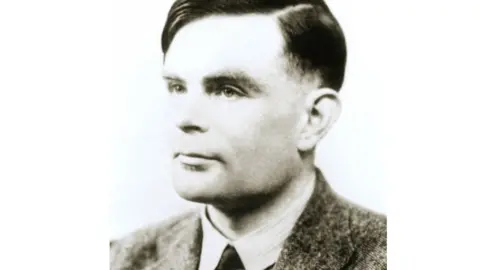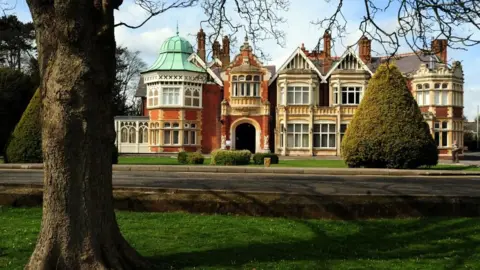Alan Turing to 'answer questions' in new AI display
 Science Photo Library
Science Photo LibraryAlan Turing, known as the father of artificial intelligence (AI), is to become a "groundbreaking" interactive display that will answer questions from museum goers.
An AI life-sized version of Turing is being created for Bletchley Park, near Milton Keynes - the once-secret home of Britain's World War Two codebreakers.
Once complete, visitors will be able to ask 'Turing' questions about his life and work - with the AI character tailoring its responses based on whether it is speaking to an individual, group or children.
Bletchley Park says the technology involved is a "world first".
Rebecca Foy, the attraction's director of public engagement, said: "Opening at the same time as a new exhibition at Bletchley Park on AI, we are looking forward to introducing our visitors to our wartime story in a new and exciting way, highlighting the part that Codebreakers, such as Alan Turing, played in the emergence of machine learning."
 PA Media
PA MediaTuring played a crucial role in the Allies' victory over Nazi Germany in World War Two by helping to crack codes and deciphering the infamous Enigma machine at Bletchley Park.
After the war he produced a detailed design for a digital computer in the modern sense, storing programs in its memory.
Sir Dermot Turing, nephew of Alan Turing and recent trustee of the Bletchley Park Trust, said: "Alan Turing's pioneering research on machine learning can be traced back directly to his work with machine solutions to codebreaking problems at Bletchley Park during World War Two.
"I know lots of people come to Bletchley Park to get a bit closer to Alan Turing, and this will be a fun way to do that."
Bletchley Park said it was working with the UK-based AI company, 1956 Individuals, to create the display.
It expected to employ some of the country's leading digital character artists.
The display, which will respond in a range of languages, was expected to take several months to complete.
Follow Beds, Herts and Bucks news on BBC Sounds, Facebook, Instagram and X.
